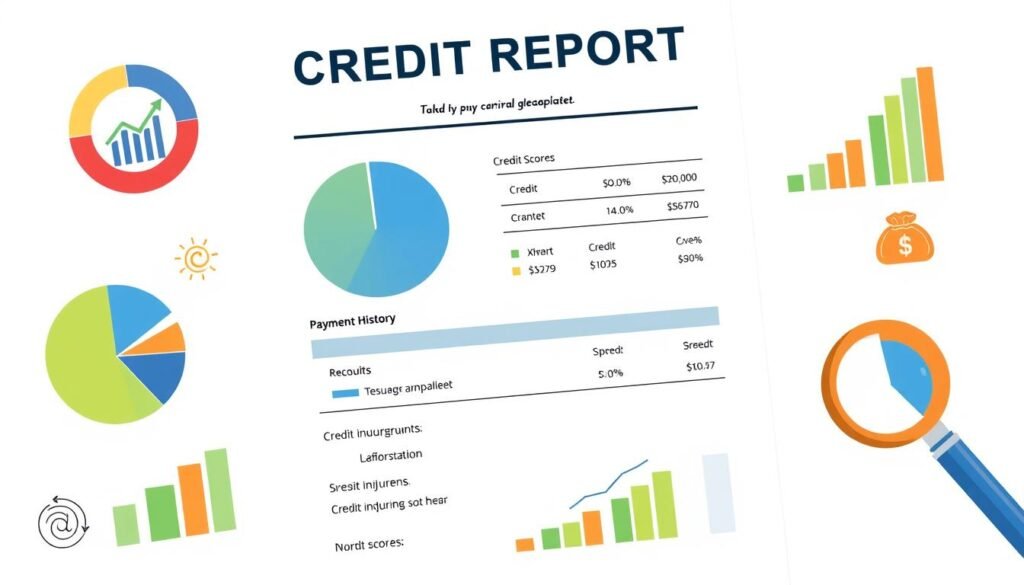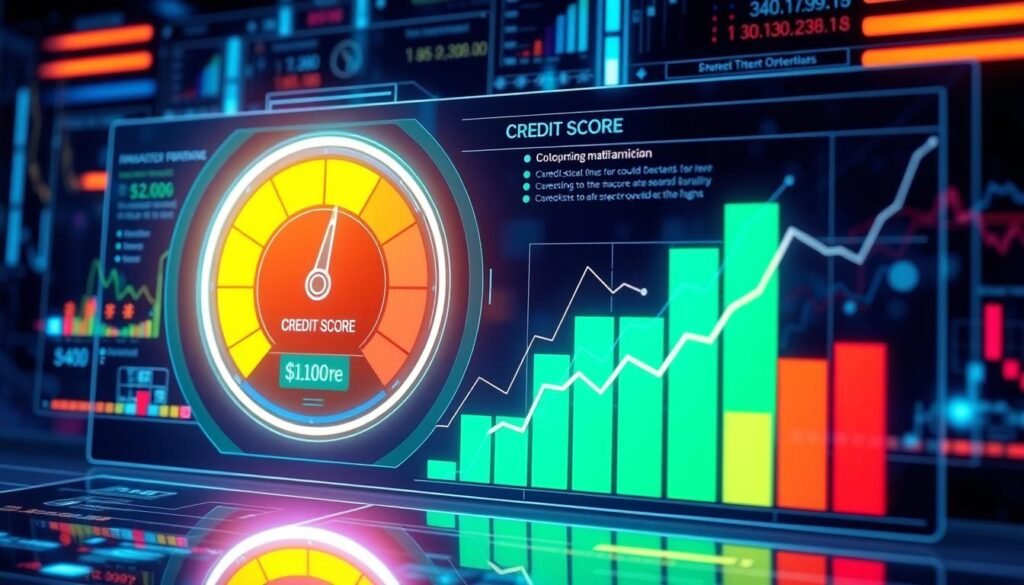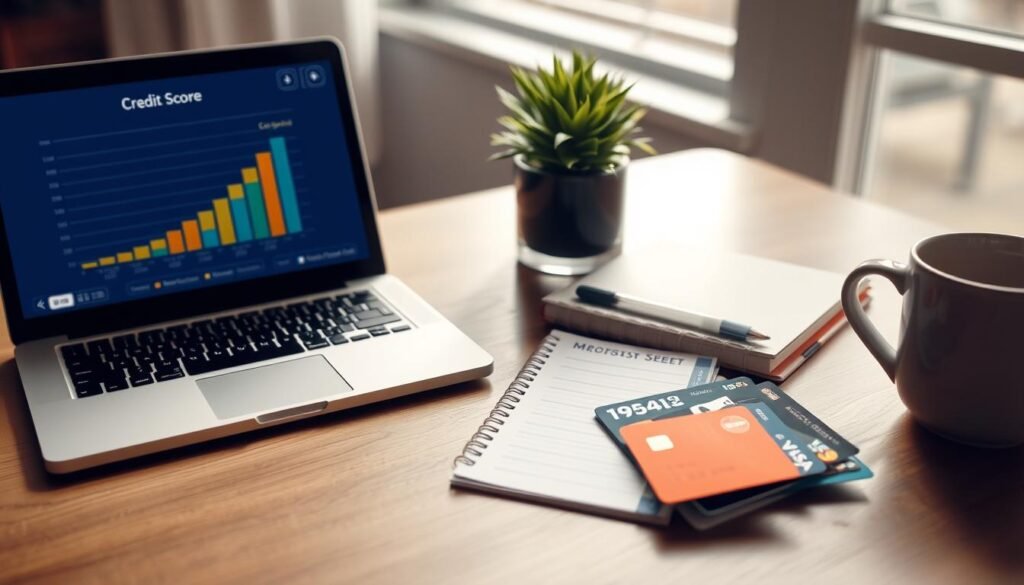Looking at your credit report can feel like solving a complex puzzle. Imagine the boost to your financial health if you could truly understand your credit report. It’s a powerful tool that shapes your financial future. From mortgage approval to credit card rates, it plays a big role. Knowing what’s in your report and its accuracy matters a lot. Whether it’s buying a home, getting a loan, or just staying financially healthy, grasping your credit report is vital.
Whenever you’re late on a payment, open a new account, or apply for a loan, it impacts your report. This can influence your chances for financial success. Your FICO credit score takes 35% from your payment history. Another 30% depends on how much you owe. Credit history length (15%), new credit (10%), and credit mix (10%) also affect your score.
Thankfully, sites like AnnualCreditReport.com offer a free yearly report from Equifax, Experian, and TransUnion. It’s essential for managing credit and spotting issues early. Checking your report yearly helps catch mistakes or fraud before they worsen.
To successfully manage this vital part of your finances, take time to look at these essential tips on reading and understanding your credit report.
Table of Contents
ToggleKey Takeaways
- Your payment history makes up 35% of your FICO credit score.
- Amounts owed account for another 30% of your FICO score.
- One free copy of your credit report is available annually from Equifax, Experian, and TransUnion.
- Errors in your credit report can significantly impact your score.
- Regular monitoring helps in catching mistakes and potential fraud.
What is a Credit Report?
A credit report is a detailed record of your financial actions. It’s collected by major credit bureaus like Equifax, Experian, and TransUnion. Learning how credit report works helps you make smart money choices. It affects your credit score, which shows how likely you are to pay back loans. A report includes your personal info, credit account details, public financial records, and lender inquiries.
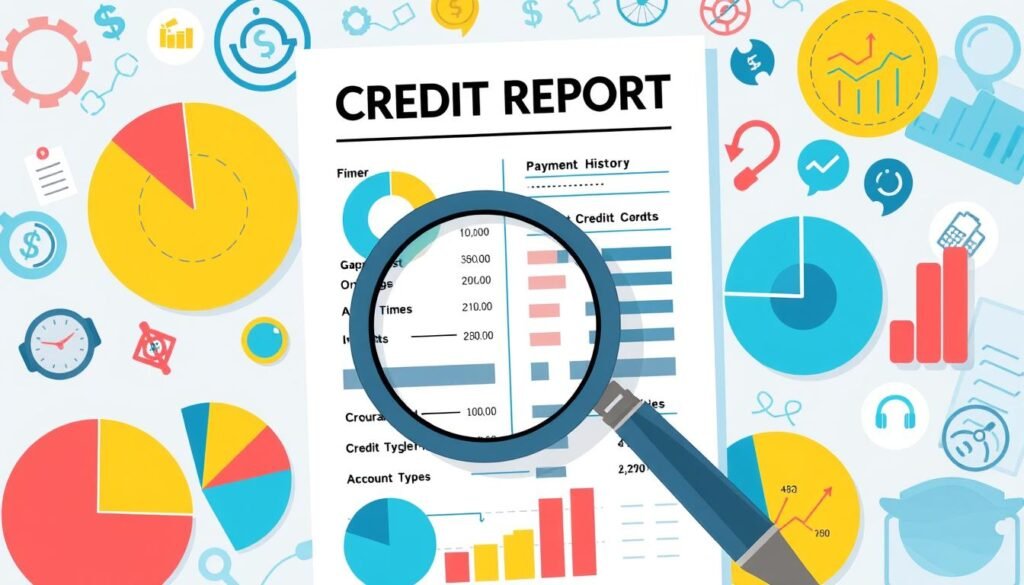
- Personal Identity Information: This includes your name, Social Security number, birthdate, and address history.
- Credit Accounts: Details of current and past credit accounts, such as credit cards and loans, including balances and payment history.
- Public Records: Information on bankruptcies, tax liens, and civil judgments, which can significantly impact your credit score.
- Credit Inquiries: Listings of who has accessed your credit report, distinguishing between hard inquiries (which may affect your score) and soft inquiries (which do not).
The three major credit bureaus—Equifax, Experian, and TransUnion—each have their version of your credit report. Not all companies report to all three bureaus. This can lead to differences in your reports. So, it’s wise to check your credit reports often for any mistakes.
By law, you can get a free credit report every 12 months from each bureau. Also, if denied credit, a job, or insurance due to your credit, you may get more free reports.
| Key Insights | Details |
|---|---|
| Annual Free Report | Available once every 12 months from each major bureau |
| Credit Score Influences | Amount owed, duration of debts, new accounts, payment history, types of credit |
| Credit Report Retention | Closed accounts (up to 10 years), Collection accounts (up to 7 years), Bankruptcy (Chapter 13 up to 7 years, Chapter 7 up to 10 years) |
| Impact of Hard Inquiries | Can affect credit score and remain on the report for up to two years |
| Error Rate | Approximately 30% of credit reports contain errors that could negatively impact your credit score |
Understanding how credit report works and checking yours often lets you find and fix mistakes quickly. It keeps your credit true to your financial habits. Also, early detection of fraud keeps your finances safe.
Understanding Credit Report: The Basics
Knowing what’s in your credit report is key to good financial health. It’s a complete record of your financial actions. This includes how you use money and pay debts. Understanding this can help avoid money problems and improve your credit.

Personal Information
Your credit report includes your name, address, Social Security Number, and birth date. This section verifies who you are but doesn’t impact your credit score. It’s important to check for mistakes to guard against identity theft which affects many people each year.
Credit Accounts
This part details your credit cards, loans, and other debts. It shows if you pay on time and how much you owe. For example, payment history is 35% of your FICO score and affects your credit rating. Accounts stay on your report for a set time after closing.
Public Records
Here you’ll find any bankruptcies, tax liens, or civil judgments. A Chapter 13 bankruptcy is listed for 7 years and Chapter 7 for 10 years. Public records can significantly harm your credit. It’s crucial to monitor this part of your report.
Credit Inquiries
Credit inquiries show who has checked your credit. They’re either soft or hard inquiries. Soft checks, like those by potential employers, don’t change your score. Hard checks can lower it by a few points. FICO allows a grace period for shopping rates without multiple hard impacts.
Check your credit report sections yearly to stay on top of your financial health. Fix mistakes right away and keep informed. This could lead to a better credit score and loan terms. Learn more about reading your credit report here.
Also, reviewing your credit report can help you make smart financial choices.
How to Get Your Free Credit Report
It’s key to stay informed about your credit status for your financial well-being. Knowing how to get credit reports is essential for managing your finances. Every consumer can get one free credit report every year from three major bureaus: Equifax, Experian, and TransUnion. The place to go is AnnualCreditReport.com. This is the authorized site for your free annual credit report.
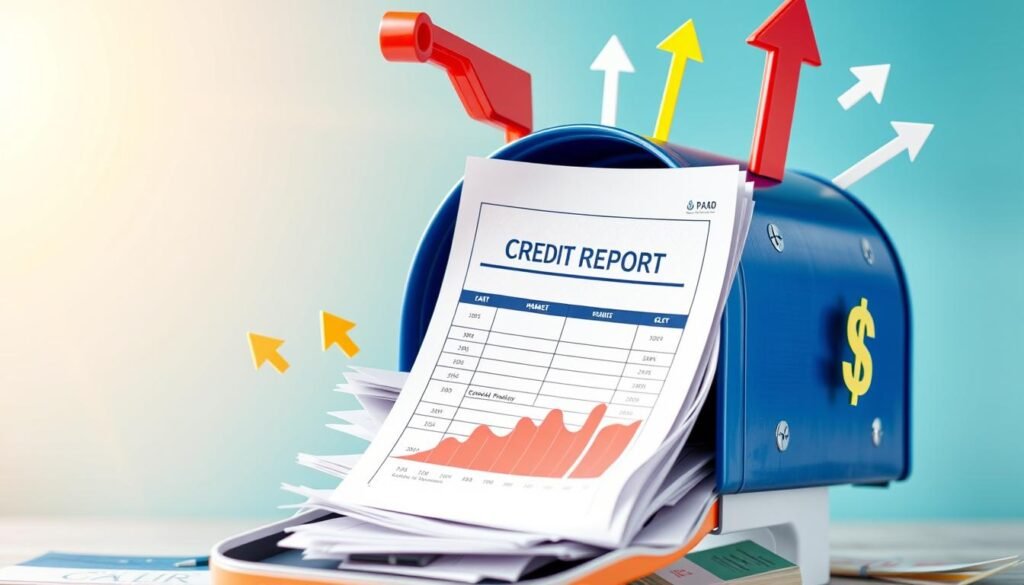
Now, you can check your credit reports weekly for free at AnnualCreditReport.com thanks to new laws. Plus, Equifax offers six free credit reports yearly until 2026. This means you have many chances to check and manage your credit at no cost.
If you get bad news about credit, a job, or insurance, you can get a free report. Just ask within 60 days of the notice. Also, if you’re jobless and will look for work within 60 days, you get a free report too.
The Fair Credit Reporting Act (FCRA) says credit bureaus must be accurate, offer a free report yearly, and fix mistakes. A Department of Justice report found that nearly 23% of people found credit report errors in 2020. These mistakes can drop your credit score by a lot. This affects loans, interest rates, and more.
To keep a close eye on your credit, spread out your free report requests over the year. Ordering one report every four months lets you continuously monitor your credit. This way, you can catch any errors quickly.
You can see your reports right away at AnnualCreditReport.com. If you order by phone or mail, it might take up to 15 days to get them. Call (877) 322-8228 for a free report. Also, most specialty reporting companies offer a free report every 12 months for deeper financial insights.
After you’ve used your free annual credit report, companies may charge up to $14.50 for another one. That’s why it’s smart to use your right to a free report. It can help you stay financially healthy.
Analyzing Your Credit Report
When analyzing credit report details, start by checking your personal and job info. Make sure everything is correct to prevent identity theft. It’s vital to confirm your details to ensure your credit report is accurate.
Review Personal and Employment Information
Your credit report lists your name, addresses, and jobs. Wrong info might mean simple mistakes or identity theft. It’s very important to ensure these details are correct for a truthful credit history.
Scrutinize Your Credit Accounts
Then, carefully review your credit accounts. This part shows your credit cards, mortgages, and loans. Look at the account statuses, limits, balances, and payment history. Mistakes here can hurt your credit score. Checking your accounts often helps find errors quickly. If you see something wrong, start a dispute under the Fair Credit Reporting Act to correct your records.
Credit monitoring services suggest regular credit report reviews. This can catch fraud early. If you find an unknown account, act fast. Staying alert protects you from financial harm and boosts your credit score.
Spotting Errors and Disputing Them
Credit reports are crucial for your financial health, so you should check them often. Errors like wrong personal info or account details can hurt your score. A study showed that 20% of people found an error on their reports.
Finding these mistakes early can save you trouble and possibly improve your score by a lot. Correct reports could also help you get loans and better rates easier.
Common Errors to Look For
Mistakes can lower your score, such as:
- Incorrect Personal Information: Ensure your name, address, and other details are right.
- Account Errors: Check for wrong account statuses and incorrect late payments.
- Duplicate Accounts: One account might show up more than once by mistake.
- Fraudulent Accounts: Look out for accounts you did not open.
- Unauthorized Hard Inquiries: Check for hard inquiries that you didn’t ask for.
How to Dispute Credit Report Errors
To dispute an error, start with these steps:
- Gather Documentation: Collect proof of the error, like bank statements or letters.
- Contact Credit Bureaus: Write a detailed dispute letter to the bureaus. Use their online platforms to make it easier.
- Monitor the Dispute: They have 30 days to investigate and must inform you of the outcome.
- Check Updates: If they correct your report, you’ll get a free copy for review.
- File a Statement: If unsatisfied, add your explanation to the report. This helps lenders understand your side.
- Consider Professional Help: Identity theft services can monitor your credit and alert you to new errors.
By law, disputing errors won’t hurt your score. But fixing mistakes quickly is key to a good financial reputation. A successful dispute means a more accurate report, showing your true creditworthiness.
Monitoring Your Credit Report
Checking your credit report regularly is key for spotting changes and signs of fraud early. This proactive step helps you safeguard your credit score and keep your finances healthy. Various services from credit agencies and others help you stay updated on new accounts or big changes in your balance.
Equifax, TransUnion, and Experian are the big three credit bureaus. They keep detailed records on millions of people. These agencies get updates from thousands of sources like banks and store credit providers, usually every month.
Services like Experian’s give you monthly credit report updates. They alert you about new accounts added to your report, typically within 30 days of approval.
Lenders look at your FICO® Scores and your reports from all three bureaus. It’s key to check each one for mistakes. Credit checks can stay on your report for two years. Hard inquiries might lower your score.
Collection accounts can drop your score a lot, depending on the scoring model. Also, you need to handle identity theft issues, often by calling Experian directly.
Regular credit report check-ups help find and fix mistakes quickly. Usually, disputes about wrong info are settled in 30 days.
Everyone can get one free credit report yearly from each big credit bureau at AnnualCreditReport.com. But, ongoing monitoring gives extra safety and peace of mind for your financial future.
Conclusion
Understanding your credit report is crucial for good credit health. You should know your payment history, credit use, and other details. This knowledge lets you manage your finances better. Payment history and credit utilization are key because they majorly affect your score.
Checking your credit report often is very important. Lenders look at these reports to see if you’re trustworthy. But, mistakes can hurt your credit score. Regular reviews let you find and fix errors fast. The Fair Credit Reporting Act (FCRA) lets you get a free credit report yearly from Equifax, Experian, and TransUnion. Check out this guide for more info.
Keeping an eye on your credit helps you understand its impact on your score. For instance, old accounts boost your credit history’s length, which makes up 15% of your score. A thorough approach to fixing errors and accurate reporting maintains your credit’s health. Use these strategies to reach your financial goals with certainty.
FAQ
What is a credit report?
A credit report is a summary of your past and present credit activities. It is made by credit bureaus like Equifax, Experian, and TransUnion. This document lists your personal details, credit accounts, public records, and credit inquiries. It is used to calculate your credit score and assess how risky it is to lend you money.
How often can I obtain my free credit report?
Every person can get one free credit report every year from each of the major bureaus. You can get them through AnnualCreditReport.com.
What should I look for in the Personal Information section of my credit report?
This section confirms who you are. Make sure everything is accurate and current. Mistakes here could mean someone else is using your identity. This doesn’t affect your credit score directly.
What details are included in the Credit Accounts section?
This part shows all your credit accounts, past and present. It lists how you’ve managed your loans and credit lines. Checking this section for mistakes is vital because errors can harm your credit score.
What are Public Records in a credit report?
Public Records track bankruptcies and legal judgments that could impact your finances. They can lower your credit score for years.
What is the difference between soft checks and hard checks in the Credit Inquiries section?
Soft checks are when your credit is reviewed without your request or for background checks. They don’t change your score. Hard checks happen when applying for loans or credit, which can slightly drop your score.
How do I check for errors in my credit report?
Start with your Personal and Employment Information for any mistakes. Then, check your Credit Accounts and Public Records for wrong info or fraud. Errors like outdated details or wrong accounts can be there.
How can I dispute errors on my credit report?
To correct errors, prepare evidence of the mistake and contact the credit bureau. It’s important to regularly check your report and dispute errors quickly to keep it accurate.
Why is it important to monitor my credit report regularly?
Keeping an eye on your credit report helps you spot changes or fraud quickly. Many services can alert you to these changes. This way, you can deal with issues right away.
Source Links
- How To Read A Credit Report | Bankrate – https://www.bankrate.com/personal-finance/credit/how-to-read-a-credit-report/
- How to Read a Credit Report and What to Look For – NerdWallet – https://www.nerdwallet.com/article/finance/read-credit-report
- What is a credit report? – https://www.annualcreditreport.com/whatIsCreditReport.action
- What Is a Credit Report? – Experian – https://www.experian.com/blogs/ask-experian/what-is-a-credit-report/
- Credit Report Basics – Experian – https://www.experian.com/blogs/ask-experian/credit-education/report-basics/
- Credit Report: What’s on Your Credit History Report & Who Checks it? – https://www.debt.org/credit/report/
- Understanding Credit – https://financialaid.berkeley.edu/center-for-financial-wellness/financial-literacy-hub/understanding-credit/
- Free Credit Reports – https://consumer.ftc.gov/articles/free-credit-reports
- How do I get a free copy of my credit reports? | Consumer Financial Protection Bureau – https://www.consumerfinance.gov/ask-cfpb/how-do-i-get-a-free-copy-of-my-credit-reports-en-5/
- Equifax Credit Report – Understanding Your Credit Report | Equifax – https://www.equifax.com/personal/education/credit/report/
- How to Read a Consumer Credit Report – https://www.investopedia.com/personal-finance/consumer-credit-report/
- Common Credit Report Errors | How to Fix Them – https://credit.org/blogs/blog-posts/common-errors-found-on-credit-reports-and-how-to-fix-them
- How to dispute credit report errors in 5 steps – LifeLock – https://lifelock.norton.com/learn/credit-finance/how-to-dispute-a-credit-report?srsltid=AfmBOooDnSUBX-vNr3hMtviyIsl4YyBZio4ZL4yvWGURCzWSywkqSVr6
- How to dispute an error on your credit report – https://www.creditkarma.com/credit-cards/i/dispute-error-credit-report
- Understanding Credit Reports: How It Is Used | myFICO – https://www.myfico.com/credit-education/credit-reports
- Understanding Your Experian Credit Report – Experian – https://www.experian.com/blogs/ask-experian/credit-education/report-basics/understanding-your-experian-credit-report/
- Credit Reports | FDIC.gov – https://www.fdic.gov/consumer-resource-center/credit-reports
- What Is a Credit Report & What Is on It? | Equifax – https://www.equifax.com/personal/education/credit/report/articles/-/learn/what-is-a-credit-report-and-what-is-on-it/

